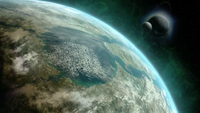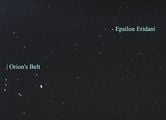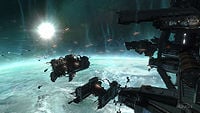Epsilon Eridani system
From Halopedia, the Halo wiki
| There is more information available on this subject at Epsilon Eridani system on the English Wikipedia. |
The Epsilon Eridani system is a stellar system situated 10.5 light years from Earth and is identified as a region in FLEETCOM Sector One. It is home to several habitable planets, most notably Reach. At 10.5 light years from the Sol system, it is one of the closest neighbors of humanity's homeworld. A massive Oort cloud is located on the outer edge of the system.[1]
History
By the early 21st century, scientific observation had deduced the presence of an inner rocky asteroid belt, an outer icy belt, and at least three planets: a gas giant the size of Jupiter, and possibly two terrestrial planets, near the inner and outer belts, respectively.[2]
The system was originally colonized by the colony ship Odyssey with the first wave of humanity's extrasolar colonization in 2362.[3] By the late 25th century, the system had become home to many of the UNSC's strongholds and military bases, such as Reach. It was protected by the UNSC Epsilon Eridani Fleet. Before the Fall of Reach, Epsilon Eridani's superior interstellar jump point had been the most active Slipstream space transfer zone (arrivals and departures) for over thirty years, with Epsilon Eridani's inferior IJP and Sol's superior IJP regularly trading second and third place spots.[4]
Humans held the system for several hundred years, until the Fall of Reach in 2552. After that, the system came under control of the Covenant. By 2589, however, humanity had reclaimed the system and had started recolonizing Reach.[5]
Planets
Epsilon Eridani is home to several planets, with at least six of them known to be inhabited;
- Reach - the former military center of the UNSC, and the most developed UNSC colony. Glassed by the Fleet of Particular Justice in 2552. By 2589 the planet has been partially reterraformed.
- Tribute - a recently set up colony, known for its industrial capacity.[6] Partially glassed during the Battle of Tribute, under UEG control as of 2558.
- Beta Gabriel - largely uninhabited, converted into an outdoors resort by wealthy entrepreneurs. Occupied by a Brute pack soon after the Fall of Reach.[7][8]
- Circumstance - famous for its universities and courts of justice. Status unknown.[9]
- Tantalus - unknown status.[10]
- Epsilon Eridani IV - known to be the site of an Insurrection.[11]
Gallery
List of appearances
- Halo: The Fall of Reach (First appearance)
- Halo: First Strike
- Halo 2
- Halo Wars (Mentioned only)
- Halo Legends
- Halo: Evolutions - Essential Tales of the Halo Universe
- Halo: Reach
- Halo: Fall of Reach
- Halo 4
Sources
- ^ Halo: First Strike, page 232
- ^ Wikpedia: Epsilon Eridani
- ^ Halo Encyclopedia (2011), page 43
- ^ Bungie.net: Halo: Reach - Intel
- ^ Halo: Reach, campaign level Lone Wolf
- ^ Halo: Contact Harvest, "Prologue"
- ^ Halo: The Fall of Reach, page 324
- ^ Halo: Evolutions - Essential Tales of the Halo Universe, "Stomping on the Heels of a Fuss"
- ^ Halo: Contact Harvest, page 62
- ^ Halo Encyclopedia, page 287
- ^ Halo Wars: Official Strategy Guide, page 22


